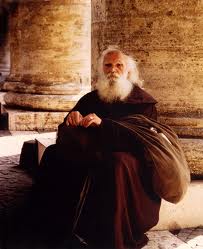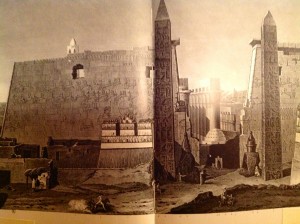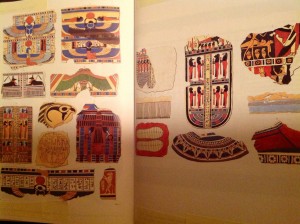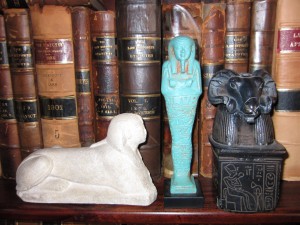

Buried deep down in one of my grandfather’s old army trunks — covered in cobwebs and almost hidden behind wooden beams in the back of the attic — I made a surprising discovery. I found his journals, a little mouldy and difficult to read, but otherwise intact. The tiny, spidery handwriting, the faded ink, and the badly creased pages made them almost illegible. Not surprisingly, I pushed them aside. They were of little interest to a 10 year old boy. It would be many years before I opened them again and began to delve into my grandfather’s hidden world.
However, at the very bottom of the trunk, I found something else which turned out to be far more interesting to me at the time. At first, I didn’t pay any attention to the rusty tin, the size of a shoebox. But when I opened it, I discovered something extraordinary; postcards, dozens of them, neatly tied together with string.
All the postcards were addressed to my grandfather and had been sent from Egypt by someone called Lucius. I spent the next couple of hours sitting on the dusty floor looking at the pictures — mainly drawings — of temple ruins, colossal statutes of strange gods and boats with triangular sails crossing the Nile. There were also pictures of camels, palm trees, hippos, crocodiles and turbaned men in long flowing robes. Images of a different, distant, exotic place — Egypt. These postcards were my first contact with an ancient culture that has fascinated me ever since.

After the excitement of my new discovery had died down a little, I carried my new find down to the kitchen to show my great aunts — both of them fabulous cooks — who lived with us at the time. The kitchen was their domain and they ruled it with iron-fisted military precision. I was responsible for the firewood and lighting the fire in the huge stove every morning at first light.
I put the tin on the kitchen table, opened it, and said: ‘Look what I found in grandpa’s trunk.’ Aunt Frieda came over and looked inside the tin.
‘You found his postcards,’ she said, smiling. ‘From Egypt. I had no idea he had kept them.’
‘Who is Lucius?’ I said, holding up one of the postcards and pointing to the signature on the back.
‘Father Lucius was your grandfather’s closest friend,’ said Aunt Rosa. She opened the oven door and looked inside. There are certain things you never forget. The mouth-watering aroma of freshly baked bread that filled our kitchen every time Aunt Rosa baked bread was one of them. ‘He was a Franciscan monk,’ she said. ‘He lived in Egypt for many years. Your grandfather visited him there once. They spent a few months together exploring the monuments of ancient Egypt. Come to think of it, your grandfather brought back many exotic things from that trip,’ said Aunt Frieda. ‘Perhaps they too are in those trunks?’

I ran up the stairs back to the attic and began to rummage through the other trunks. At first I found only books; many of them about Egypt. But then I found the real treasure; strange artefacts. Scarabs, small stone statures and many etchings and lithographs

It soon became apparent that my grandfather had been quite a scholar with some quite surprising interests, especially for a career soldier serving in the Austro- Hungarian Army. When I eventually opened his journals again many years later, most of what I read made no sense. The concepts and ideas, the many references and quotes simply just went over my head. The breakthrough came when I discovered that a particular set of quotes was in fact an extract from a book in his library right here in the attic! It was like opening a window to let in sunshine and fresh air. After that, everything began to fall into place.
The book in question was a history of a fascinating order of notorious warrior-monks, The Knights Templar. As I was soon to discover, the Templars and their secrets, was one of the three main topics addressed in the journals. The other two dealt with the pharaoh Akhenaten – the heretic king of Ancient Egypt – and a French priest called Sauniere who lived in the 19th century.
At first, these topics appeared unrelated. However, as I began to delve deeper into the journals, I discovered that this was far from so. What brought them all together was another extraordinary discovery. One of the leather-bound journals at the bottom of the trunk which I assumed belonged to my grandfather, didn’t belong to him at all! It was the diary of his best friend; Father Lucius!
The two learned friends had collaborated for years to unravel an extraordinary mystery. This mystery involved the Templars, the pharaoh Akhenaten and a French priest. This fascinating story inspired me to write The Empress Holds The Key which will be published in November.
However, to prepare the way, I will tell you more about the Templars and Akhenaten. In addition, I will release a free eBook called Letters from the Attic which will throw further light on the journey of the book and, hopefully, pique your interest to read it once it is published.




